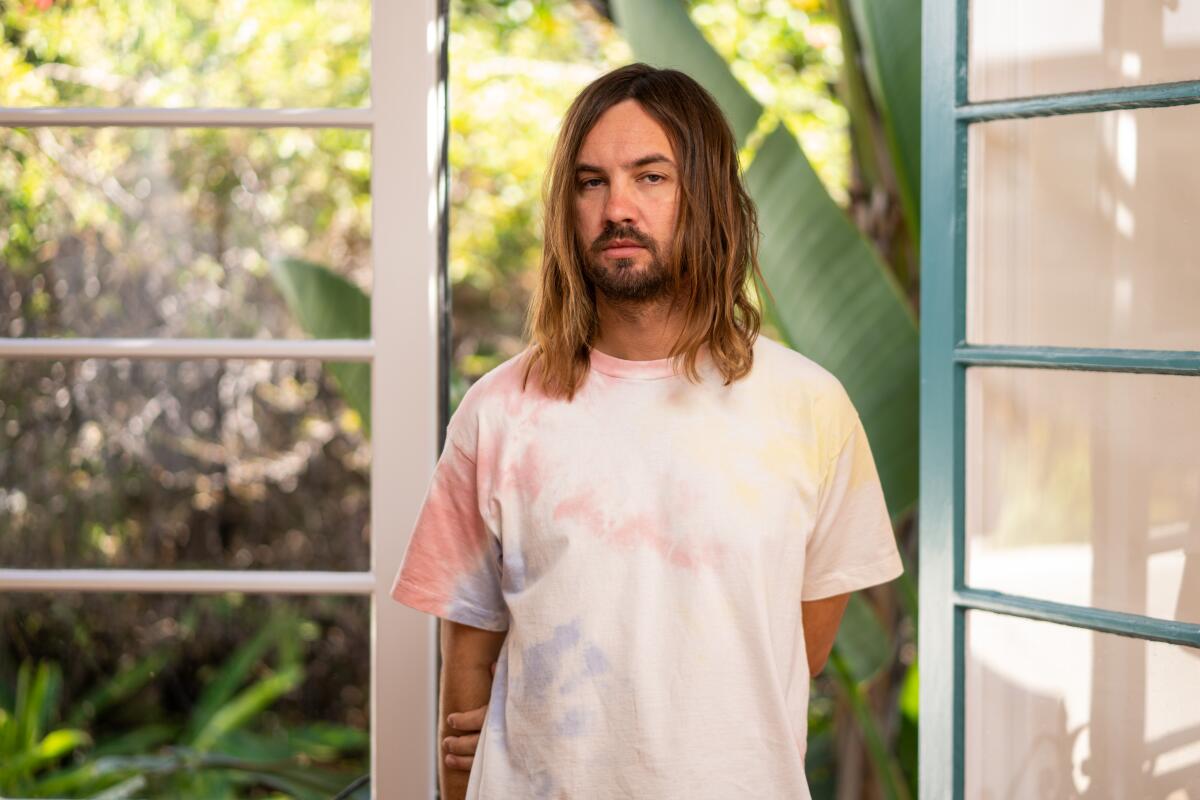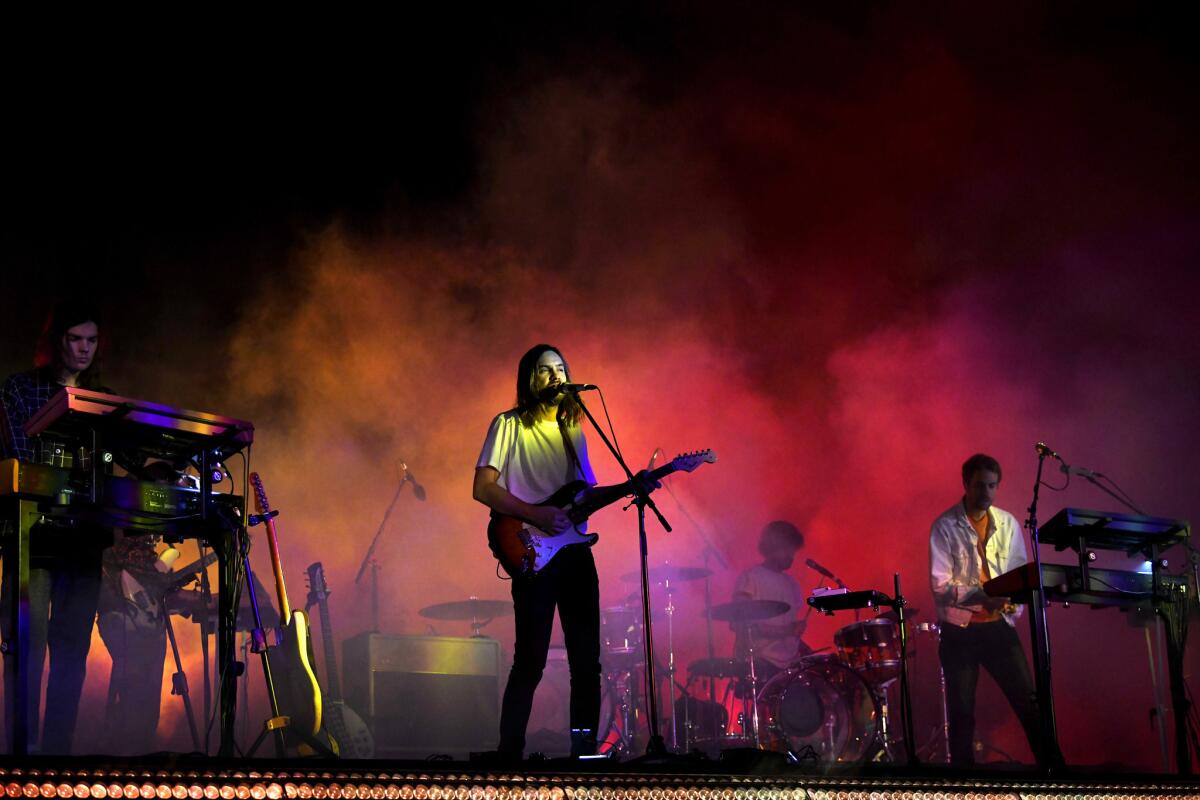Tame Impala’s Kevin Parker on making music in 2020: ‘I’m excited there are no rules anymore’

Kevin Parker says his new album as Tame Impala reflects two major life events.
The first was marrying his girlfriend, Sophie Lawrence, in early 2019 in western Australia, where Parker started his one-man psych-rock band more than a decade ago and where he still lives when he’s not spending time in his second home of Los Angeles.
The other was downloading that app that shows you what you’ll look like when you get old.
“It sounds stupid, I know,” Parker, 34, said of FaceApp, which caused a social-media frenzy last summer as users scrambled to post photos of themselves with digitally enhanced wrinkles. “But coupled with getting married, seeing myself as an old man really made me feel like I was reading the book of my life. I could see exactly which chapter I’d just finished and which chapter was just beginning.”

The result of his musings is “The Slow Rush,” Tame Impala’s cosmic knockout of a fourth studio LP. Due Feb. 14, the album floats Parker’s sage observations on life’s forward march — sample titles include “One More Year” and “Tomorrow’s Dust” — over trippy, gorgeously detailed arrangements that knowingly juggle sounds from different eras: fuzzy retro-’60s guitars, slick ’70s-era disco grooves, ringing piano licks from the house music of the 1990s.
“The feeling that time has passed and you didn’t even realize it — that’s the driving emotion of this record,” Parker said on a recent afternoon at the airy Spanish-style place he and his wife (who’s a partner in a boutique ice-cream company) share in the Hollywood Hills. Sipping a can of LaCroix as he took in the postcard-perfect view from a balcony, the low-key frontman added that that feeling applied to his experience making the album itself.
Parker — who writes, plays and produces everything on Tame Impala’s records — never intended to take five years to follow up his 2015 breakthrough, “Currents,” which racked up hundreds of millions of streams and earned a Grammy nomination for best alternative music album. But its success kept him busier than he’d anticipated: After Rihanna remade his song “New Person, Same Old Mistakes” on her “Anti” album, other pop and hip-hop stars sought him out for high-profile studio gigs; he co-produced Lady Gaga’s single “Perfect Illusion” and contributed to tracks by Travis Scott, Mark Ronson and Kanye West, each of which bore clear marks of his step-into-my-daydream style.
“I don’t know anyone who wouldn’t want to work with Kevin,” said Kali Uchis, the L.A.-based electro-soul singer who enlisted Parker for the spacey “Tomorrow,” from her 2018 disc “Isolation.” “Artists have a lot of respect for someone with such a distinct sound.”
With the help of several old friends from the music scene in Parker’s native Perth, Tame Impala also became an in-demand live act, as seen last year at Coachella, where the group played an immersive headlining set (complete with a lighting rig that resembled a UFO) after several years in which the desert mega-festival went without a rock band at the top of its bill.
Now, without Parker quite meaning to, “The Slow Rush” is finally dropping at what turns out to be an opportune moment for a well-connected guitar hero beloved by kids otherwise obsessed with rap.

Asked why he thinks rock has lost much of its appeal among younger listeners, Parker said the genre “trips itself up on ideals” — purist notions about the superiority of “real instruments” and the like — “rather than just wanting to have fun or to try new things.” To a generation raised on computers, he went on, that makes no sense.
“But I do believe someone will come along and change it,” said Parker, dressed in black jeans and high-top sneakers. Tucking his shoulder-length hair behind his ears, he seemed suddenly to envision his words in print. “It might not be me; it probably won’t be me.”
Then again, it may well be him. Already, Parker — a self-described introvert who formed Tame Impala after playing in a series of grungy local bands in Perth — has demonstrated an eagerness to evolve, from the throwback psychedelia of Tame Impala’s 2010 debut, “Innerspeaker,” to the more expansive “Lonerism” in 2012 to “Currents,” which embraced elements of soft-touch R&B and dance-all-night club music. Tellingly, when Rihanna recorded her version of the swaggering, slightly spooky “New Person, Same Old Mistakes,” she did little but replace Parker’s vocals with her own — an obvious endorsement of his production approach by a singer coming from an entirely different direction.
For “The Slow Rush,” which Parker made in Perth and in L.A. — including an early session at a Malibu Airbnb he’d rented, then hurriedly left, amid 2018’s Woolsey fire — one of his goals was writing “less structured and more meandering” melodies than he had in the past. And indeed there’s a newly tender quality to songs including “Borderline” and “It Might Be Time,” both delivered in Parker’s boyish croon, that evokes a guy following his thoughts around inside his head.
“It’s like something Frank Ocean would do,” he said of the enigmatic R&B star. “Something I love about Frank is he’s just making brushstrokes on a canvas with no intention of repeating it. It’s completely captivating, but it sounds so off the cuff.”
As a lyricist, Parker can tend toward the abstract. (“I heard about a whirlwind that’s coming ’round / It’s gonna carry off all that isn’t bound,” goes one couplet in “Let It Happen,” from “Currents.”) In conversation, though, he’s forthright: Comparing his evacuation from Malibu to the brush fires that ravaged Australia last month, he lamented that such disasters were unlikely to spur substantive action on climate change by Australian Prime Minister Scott Morrison, whose election he attributed, in part, to Morrison’s promise of jobs to conservative voters in coal-rich Queensland.
“People never cease to amaze with their stubbornness,” Parker said of the prime minister’s reputation as a climate denier. “At least he’s not as bad as Trump. He’s not a cartoon character.”
Parker is unusually specific in the new album’s “Posthumous Forgiveness,” which addresses his late father, with whom Parker had a strained relationship before he died of skin cancer in 2009.

“You decided to take all your sorrys to the grave,” Parker sings over tolling minor-key synths. Then, as the music brightens, he runs through a list of more recent moments he would have enjoyed telling his dad about — including “the time that I had Mick Jagger on the phone” to discuss his remix of Jagger’s 2017 solo single “Gotta Get a Grip.”
It’s a moving moment, which Parker said was his intent, even if he lacks a songwriter’s confessional reflex. “I don’t necessarily need to tell the world how I feel about my dad,” he said as he absentmindedly thrummed the side of his iPhone, which had a cracked screen. “But I do want to make music that makes people feel something, and I knew that tapping into that would be a vast source of emotional content for me.” He laughed. “To put it in a very cold way.”
Astutely, he likened the sensation that Tame Impala’s music provides to “that feeling of euphoria after a big cry, when you realize you’ve got it all out.”
Much of the lift in his songs comes from the drums, on which Parker estimates he spends 90% of his time in the studio. “They’re the lifeblood of my music,” he said — a view more common among hip-hop producers than rockers. He cites Portishead and Cypress Hill as early influences on his ideas about rhythm; even now, he loves the way a rap beat “can come from anywhere,” as when Kanye West and Jay-Z used a burst of white noise as a snare in an unprintably titled track from their “Watch the Throne” album.
That hip-hop attraction runs both ways: Parker’s drums — funky and propulsive, yet oddly soothing — are a big part of why rappers are drawn to him. But it’s also his seriousness about percussion that leads him to prefer working by himself.
“I think of drum patterns by grinding my teeth,” he said, “which looks really stupid.” To demonstrate he jutted out his lower jaw, then stopped. “I’ve never actually explained it before. But I have a kick drum sound and a snare sound and a hi-hat sound, which is sucking saliva across the top of my mouth.” He laughed. “Anyway, it’s something I’d rather do on my own.”
In an age when many hit records are assembled over the internet, there’s plenty of work for the solitary man. Yet Parker, who moved part-time to L.A. because it’s the global center of pop record-making, is trying to get used to writing with other people in the room. “It’s kind of the one thing holding me back from doing more production,” he said. And now is not a moment for anyone creative to be held back.
“I’m excited that there are no rules anymore,” Parker said of a pop scene teeming with fresh talent such as Billie Eilish and left-field smashes such as “Old Town Road.” “And I love that record labels don’t know what to do. They’re like, ‘Wait, do we just make a TikTok song?’ They’re scratching their heads along with everyone else.”
What does that mean for “The Slow Rush”? Parker said his success in the Top 40 world has relaxed his commercial expectations for Tame Impala; the way he sees it, the former bought him some artistic leeway to do only what he wants with the latter.
There’s also the band’s increasingly healthy touring business to rely on. This spring, the five-man live version of Tame Impala — which Parker took on the road reluctantly in the early days — will play arenas, including shows at the Forum on March 10 and 11, before headlining the Governors Ball and Bonnaroo festivals in June. Stephen Greene, who books Bonnaroo, saw the group last year for the first time since 2016 and recalled being impressed by its muscle.
“It was clear they’d decided to become a live band — like, a real live band,” Greene said, adding that Parker’s songs are so catchy “that they almost transcend the fact that they have guitars in them.”
Pumped though he is to perform the new material, Parker’s already looking ahead to making Tame Impala’s next album, which he said he definitely won’t wait five years to release. It’ll have a different vibe, he reckons — not so wide-eyed, maybe a bit harder-headed.
As “that dumb app” reminded him last year, he said, “I won’t be young for much longer.”
More to Read
The biggest entertainment stories
Get our big stories about Hollywood, film, television, music, arts, culture and more right in your inbox as soon as they publish.
You may occasionally receive promotional content from the Los Angeles Times.











